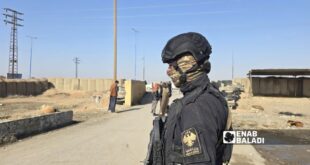ABU DHABI — British Prime Minister Tony Blair’s drive to revive Middle East peacemaking is failing to reverse the damage done to his credibility by Iraq and this year’s Lebanon crisis, analysts say.
Any clout he may have had has been eroded by his unwavering support for US Middle East policy that many Arab leaders view as biased towards Israel and by his inability to persuade Washington to commit to a concerted push for peace, they say.
Blair capped his peace mission on Tuesday in the United Arab Emirates on the final leg of a marathon tour that took him to Turkey, Egypt, Iraq, Israel and the Palestinian territories.
His aides say he acts as an interlocutor between Arab, Israeli and world leaders but many experts dismissed that.
“Blair has absolutely no credibility left in the Middle East amongst the people who are voting,†said Rime Allaf, associate fellow of the Middle East programme at British think tank Chatham House.
Blair’s aides see the trip as a public relations exercise by a leader who, in his final months, is trying to claw back a foreign policy legacy that is marred by Iraqi bloodshed. Other observers did not doubt Blair’s commitment but said he lacks influence over events.
The Iraq war angered many Arabs but Blair’s refusal to call for an immediate halt to Israel’s shelling of Lebanese villages during the July-August war with Hizbollah fighters was the final straw, she said.
“Most people understand the US is pretty much embedded with Israel in this but Britain took a clearly distinct stance form Europe and the rest of the world [on Lebanon].†Blair’s position on Lebanon lost him support among some Labour lawmakers who had stayed loyal over Iraq. That, in part, piled pressure on him to announce he would resign next year.
Â
Little impact
Â
Progress on the Middle East was Blair’s way of making peace with the Labour faithful he angered over Iraq, analysts say.
“Tony Blair is trying fulfil a promise that he made, under pressure, to his voters and members of his own parliamentary party,†said Israeli analyst Mark Heller of the Institute for National Strategic Studies in Jerusalem.
“In terms of his intentions, it probably is a serious effort. But in terms of the consequences, it’s not likely to have a serious impact on the course of developments.†Blair, however, is undeterred by his critics.
“I will not rest for a single moment until we have delivered what we both want to see,†he told a news conference with Palestinian President Mahmoud Abbas on Monday.
Blair’s spokesman said the premier had been pleasantly struck by the “different quality of engagement†between Abbas and the Israelis and he would continue his peace drive early in 2007, possibly with another trip to the region.
Blair promised Abbas fresh international aid to strengthen him before new elections, called after he failed to form a unity government with a Hamas-led coalition boycotted by the West.
Critics accuse Blair of meddling in Palestinian politics but some Arab officials welcomed his peace drive.
“All those who are interested and eager to help are welcome,†former Egyptian foreign minister Ahmed Maher told Reuters, saying Blair appeared genuinely committed to peace.
“It is logical… that the prime minister would like to do something positive in the Middle East [after Iraq].†Israeli Prime Minister Ehud Olmert said Blair had come with “new ideas, new initiatives,†but gave no details.
Some analysts say support for Abbas from London and Washington could backfire, prompting more Palestinians to vote for Hamas, rejecting Abbas’ close ties with the West.
“He dreams of making a historical achievement in the Middle East before he leaves office but this is highly unrealistic because of the complexity of the situation,†said Mustapha Al Sayyid, political science professor at Cairo University.
 Eurasia Press & News
Eurasia Press & News



